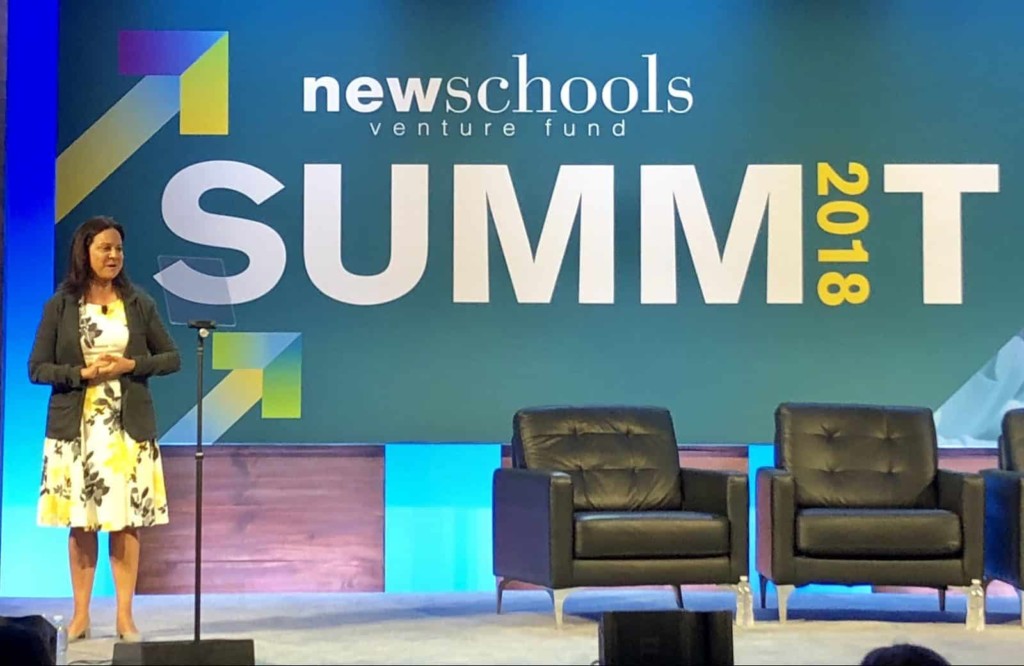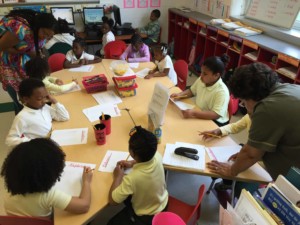Equity and Innovation at NewSchools Summit

With a call to leverage diversity for innovations in learning, Stacey Childress (@NextGenStacey) opened the NewSchools Summit (#NSVFsummit) in San Francisco. The national nonprofit catalyzes new schools, encourages better EdTech tools and develops diverse EdLeaders.
Twenty years ago, with support from venture investors John Doerr and Brook Byers, Kim Smith launched the NewSchools Venture Fund. With more than $200 million invested, NewSchools has supported hundreds of education entrepreneurs and sponsored over 500 new schools.
The Summit is a curated one-day event for 1,300 invited equity-focused innovators. A highlight was the student voices that opened each general session.
“America is uncomfortable with the America we’ve created,” said DeNora Getachew, Generation Citizen, in an opening session on the state of democracy. She urged getting young people involved in grappling with tough issues, the ones we’re reading about in the paper every day. The result, said Getachew, would be youth agency, a sense that my voice matters as well as complex problem-solving skills. But remember, “Democracy is a full-contact sport.”
Rand CEO Michael Rich, the author of Truth Decay, shared his concern about the heightened disagreement about facts that have resulted from the explosion of opinion advanced by various forms of media. “We haven’t equipped young people with the ability to differentiate facts from opinions,” said Rich.
Ryan Streeter, American Enterprise Institute, acknowledged the collapse of confidence in public institutions but noted (citing a Raj Chetty study) that communities with richer social capital networks have stronger social mobility. He (like Getachew) urged engaging youth in problem-solving and community effort to build bridging social capital to boost life outcomes.
A couple of the breakout session of note are highlighted below.
AR & VR in Education
EdTech leader David Esselman founded Level Up Education which is developing the first virtual reality-based high school (and shooting for a 2020 opening). Esselman led a well-informed discussion of the current and near-future applications of augmented and virtual reality in learning.
Tina Tran from Oculus (speaking below) said her company is creating content for empathy training, lifelong learning and scientific exploration (eg, human body, space, geography). Oculus Go, a $199 headset and controller, was announced earlier this month. Train is excited about the development of social co-presence but wants to see teachers use the best tech for the job.
Mande Holford (@scimaven, right above) is a professor at Hunter College and founder of Killer Snails (@KillerSnails1), a learning games startup. She sees education headed for multimodal teaching using AR and VR for inquiry-based learning. Key will be “Coming back to a digital journal for observation,” added Holford.
Eric Cross (@sdteaching, below left) teaches science at the Albert Einstein Middle School in San Diego. He sees VR as a good immersion hook but not yet great at deeper learning. Cross urges student and teacher access to this emerging technology but sees the thousands of underutilized 3D printers around the country a cautionary tale. “Proceed with caution, put devices in teachers hands and let them co-create,” said Cross.
Joey Webb is founding principal at Washington Leadership Academy (@WLApcs, above right), an XQ grant winning new school in Washington D.C. He’d like to see a balance between consuming and creating content in VR. WLA has some students programming in Unity. Next spring WLA will launch a modular U.S. History curriculum co-created by students.
The bottom line, said Esselman, is that it’s early–but there are many signs of progress. “A year ago you wouldn’t have seen storytelling and creation be apart of the story,” added Esselman noting the VR vendors in the exhibit hall.
City As Classroom
Saskia Levy, Carnegie Corporation, facilitated a session on using the city as a classroom (what we call place-based education). Connie Yowell (right below) described LRNG’s strategy to extend equitable learning to all students. A leader in badging out of school learning, Yowell’s team seeks to make learning “granular, customizable, flexible.”
Scott Bess (left above) described his new XQ winning Indianapolis high school, Purdue Polytechnic and their efforts to engage students in personalized real-world learning (imagine every student building a customized schedule every week).
#FutureOfWork
About the rise of artificial intelligence, provocateur Vivienne Ming (@neuraltheory) said, “The professional middle class is about to be blindsided.”
On the American dream, Ming said, “Old promises don’t hold anymore.” She said, “We need to build a society of creative, adaptive, problem solvers.”
Stanford professor Jeremy Bailenson talked about his new book on virtual reality, Experience on Demand. While a fan of VR, Bailenson said it should be used where other applications would be impossible, expensive, or dangerous. He thinks VR can be particularly useful in building empathy and solving conflicts.
Robots are quickly getting better and cheaper said Michigan professor Chad Jenkins. His Robotics Institute is working hard to make your world programmable in applications including agriculture, healthcare, infrastructure, education and exploration. Jenkins urged schools to prioritize linear algebra over calculus.
Indianapolis elementary student Phoenix urged attendees to “Be supportive of kids dreams and help them find their superpower.”
NextGen Assessments
NewSchools’ Debbie Veney moderated a panel on assessments that highlighted the work of PACE districts in New Hampshire. Four districts are piloting performance assessments that could reduce or replace state tests. The theory is that involving local leaders will foster positive organizational learning and build internal motivation and capacity. Teachers in PACE districts meet over the summer to calibrate their assessments.
Sara Bartolino Krachman directs Transforming Education, a nonprofit working on measuring hard to measure skills Mindsets, Essential Skills and Habits (MESH). She said these intrapersonal and interpersonal mindsets and competencies have shown to be: meaningful, measurable and malleable. Krachman is excited about performance tasks and game-based assessments.
Rebecca Kockler, Louisiana’s assistant superintendent of academics, discussed the importance of quality instructional materials and aligned assessments. Her goal is that every day, students should build their knowledge of the world, read meaningful text, express themselves in writing and attempt to solve complex problems. Her department has probably done more than any other state to provide quality materials and aligned resources.
Thanks For Your Contribution
Among the hundreds of extraordinary education leaders at the Summit, it’s worth noting the contribution of three people that recently announced they are leaving the organizations they founded.
Aimee Guidera (@AimeeGuidera) founded the Data Quality Campaign (@EdDataCampaign) 15 years ago. She’s been the leading advocate for using data to improve schools for the kids and communities that need it most.
Scott Morgan (@scottmorgan1) led Education Pioneers (@edpioneers) for 15 years. He was an early leader in the talent development movement, attracting and developing diverse talent to all facets of school district leadership.
Jonas Chartock (@jonaschartock) launched Leading Educators almost eight years ago to promote distributed leadership and teacher development.
All three leaders have made big contributions to American education and had the opportunity to be part of a thoughtful transition to ensure the future success of the organizations they founded.
For more:
Stay in-the-know with all things EdTech and innovations in learning by signing up to receive the weekly Smart Update. This post includes mentions of a Getting Smart partner. For a full list of partners, affiliate organizations and all other disclosures, please see our Partner page.









Patti Shade
Actualizing student #creativityskills changes lives and changes the world we live in! #education #learning #CreativityCrusader